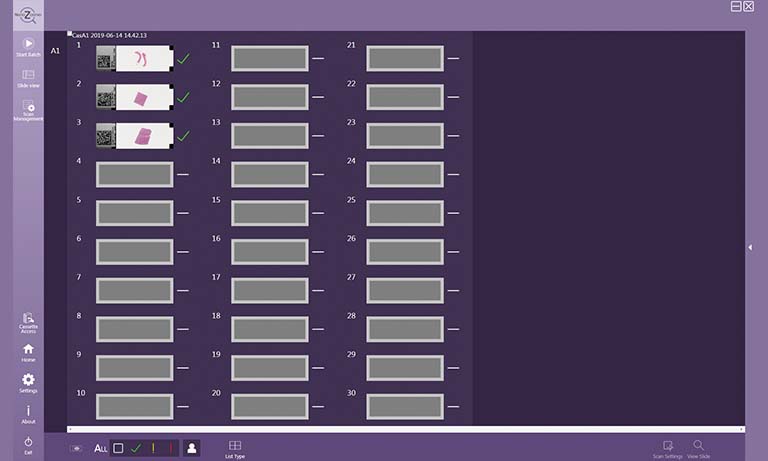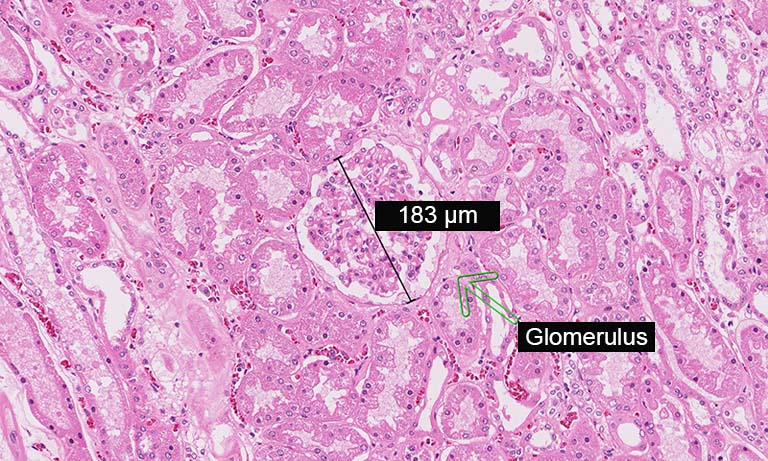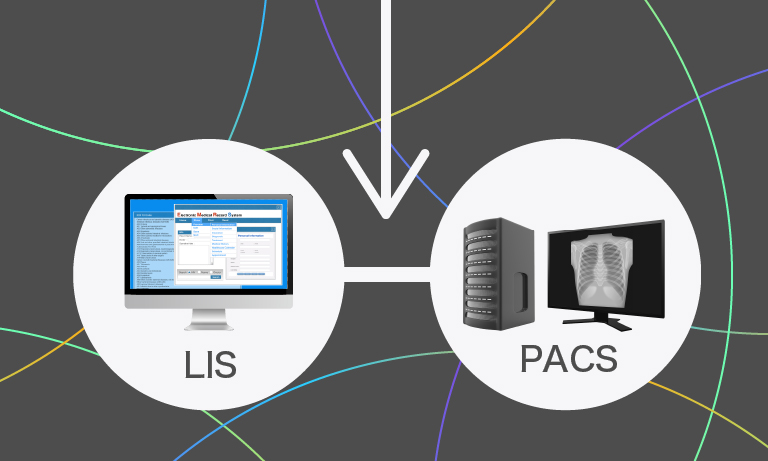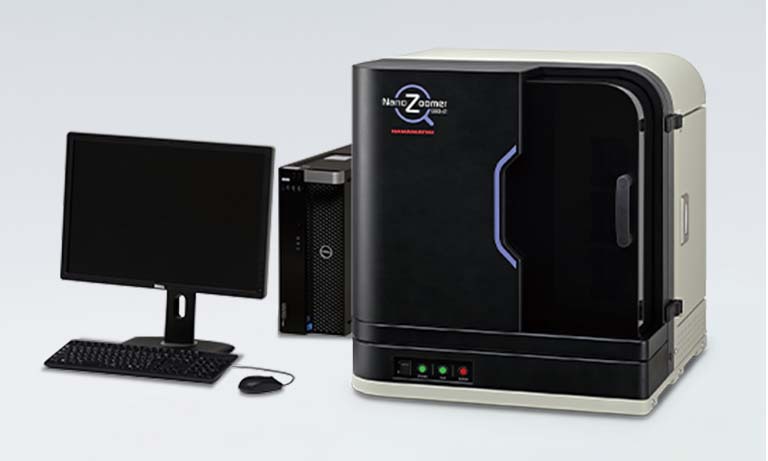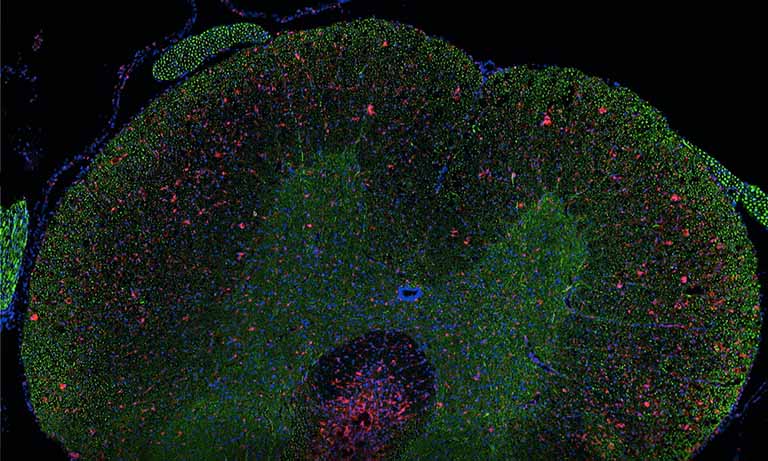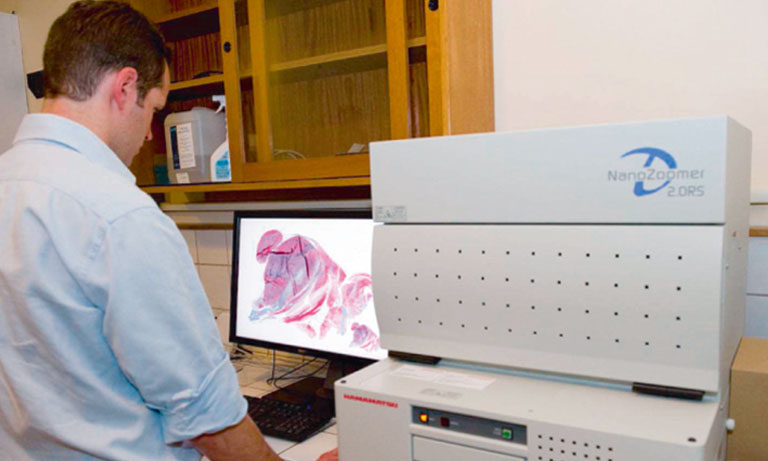Why NanoZoomer
Products
Solutions
Case study
Resources
Japan (EN)
Select your region or country.
Scan
Glass slides are scanned and captured as billions of pixels of high-definition image data in order to ensure details of tissues are clearly displayed.
Scanning mode
Features two “Batch” modes for dealing with large numbers of slides and a “Single” mode for dealing with individual slides. The NanoZoomerⓇ series comes with their own image acquisition software such as NZAcquire or NDPⓇ.scan, which provides an easy way to convert glass slides into digital ones. You can choose from three different scan modes to fit your applications.
Batch mode
Fully automatic
NDP.scan and NZAcquire perform all operations required for scanning automatically. This includes loading slides, recognizing the sample location, and setting the scan areas, focus points, and other options.
It can scan up to the maximum capacity of the scanner.
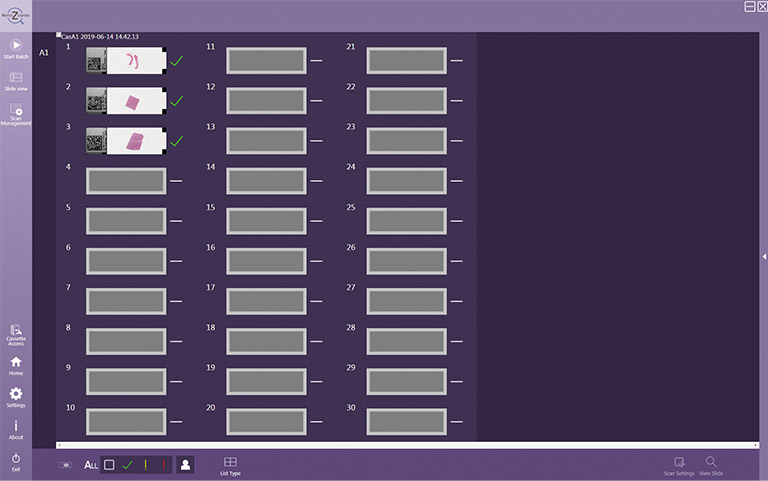
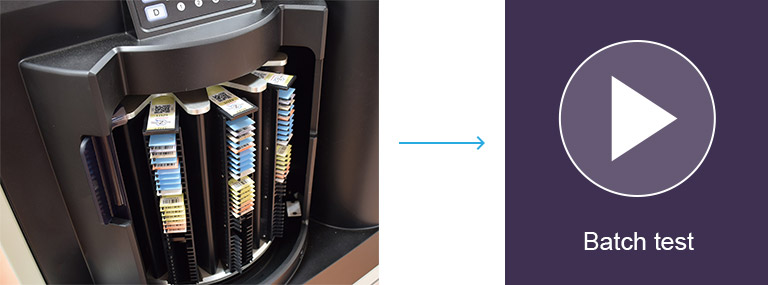
Semi-automatic
Simply set the scan options for each slide and NanoZoomer will scan the slides automatically.
Configurable options:
- Scan area
- Scan resolution (20× or 40× mode)
- Number of layers (Z-stack)
- Focus point locations

Single mode
Single side mode
You can set scan functions for each individual slide. The configurable functions are the same as those available for semi-automatic. Additionally, in single slide mode, you can verify focal points and make precise adjustments manually to each focus points.

Profile functions
The NanoZoomer series has the capability to save recognition conditions such as sample size and threshold. By creating this profile for each individual user and staining type, you can easily scan with the same settings. By combining the profile function and NDP.serve3 Web slide server, you can build a workflow that automatically performs from scanning to image publishing.

Barcode reading
NDP.scan can automatically read a 1D* or 2D** barcode and include this information in the digital slide. This function makes it easy to share slide data with other databases.

Z-stack feature
There are samples which have 3D structures such as clumps of cells and thick tissues. They require focus adjustment during observation. To handle these kinds of slides, the NanoZoomer series is equipped with the Z-stack feature that allows you to focus on different depths in the sample. The NDP.view2 viewer software lets you adjust the focus on a Z-stack slide much like you would adjust the focus of a microscope. You can also point to an area of interest and let NDP.view2 apply autofocus for maximum clarity.
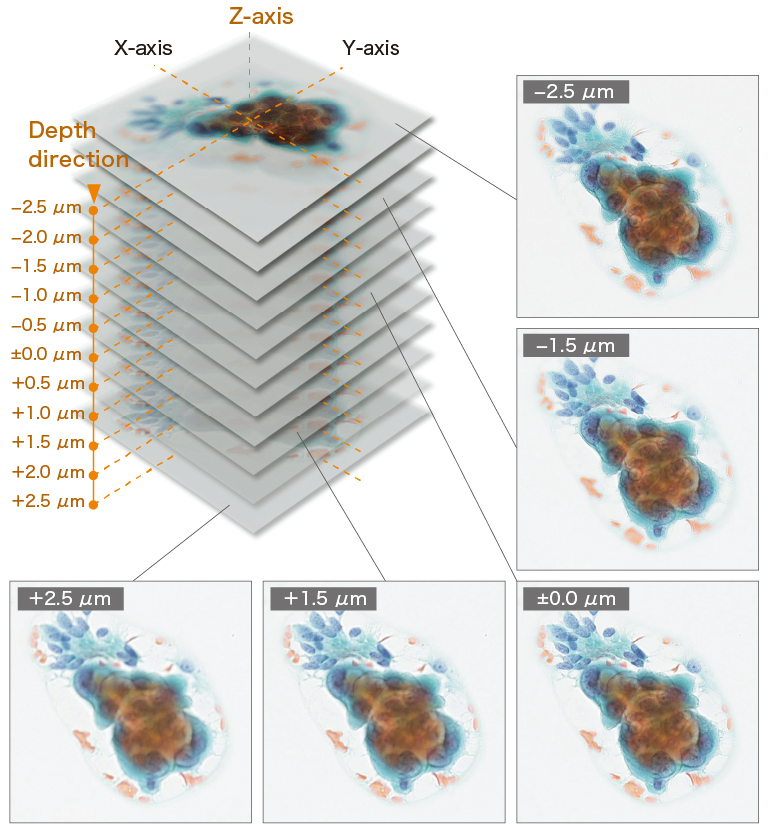
Focus adjusting
NDP.scan can adjust the focus as though it were tracing the sample surface. The NanoZoomer series uses a single focal plane for even surfaces, but if the surface of a sample is uneven, the NanoZoomer series will break the sample area up into smaller regions and assign an appropriate focal plane to each area.
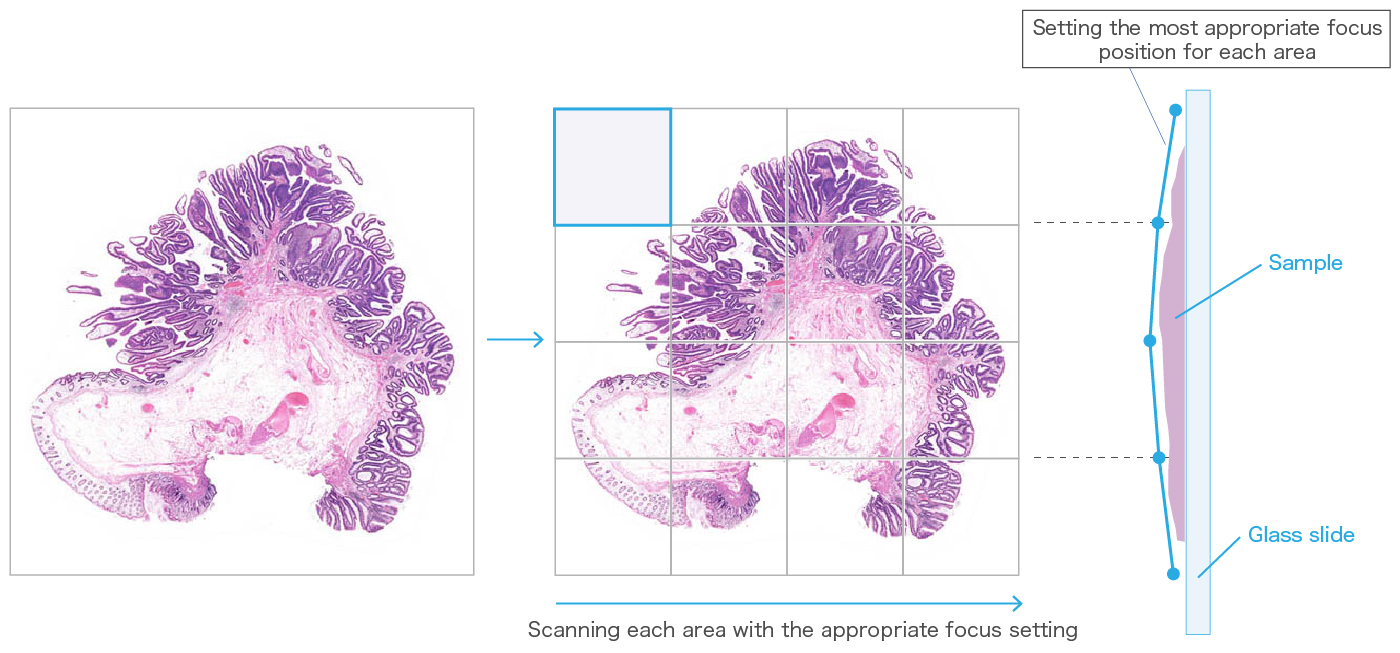
Focus scoring
Slide quality check is conducted after scanning to avoid scanning failure caused by dirt on a slide or sample folding. The NanoZoomer series evaluates scanned whole slide images automatically and generates a focus score of each slide for your quality review. A score is automatically determined for each check point. Then a focus score is generated and displayed on a monitor screen. This display is a reference to help the user select the areas used for quality check.
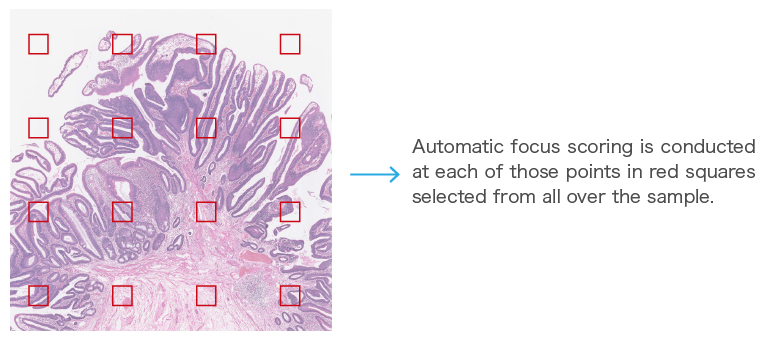
Improving the efficiency of visual checks
In addition to the above, NZAcquire can display the focus pass/fail distribution over the entire image of the virtual slide. This display is a reference to help the user select the areas used for quality check.
You can also perform focus pass/fail scoring and extract/identify images with an adjustable standard score or lower from the scanned images.
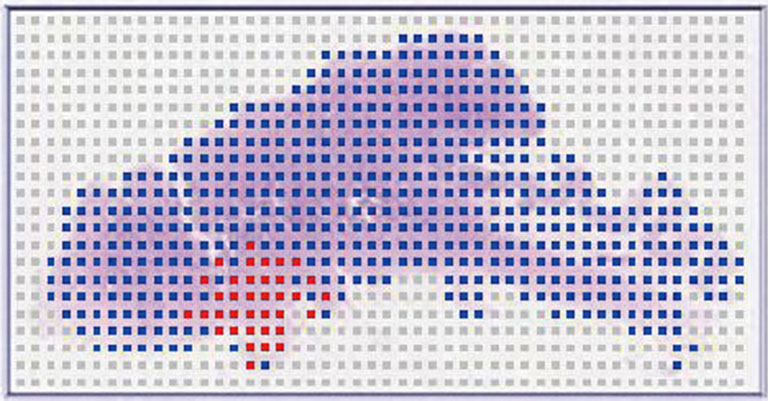
Focus pass/fail is indicated by color. The red area is the location of focus failure.

- Confirmation
-
It looks like you're in the . If this is not your location, please select the correct region or country below.
You're headed to Hamamatsu Photonics website for JP (English). If you want to view an other country's site, the optimized information will be provided by selecting options below.
In order to use this website comfortably, we use cookies. For cookie details please see our cookie policy.
- Cookie Policy
-
This website or its third-party tools use cookies, which are necessary to its functioning and required to achieve the purposes illustrated in this cookie policy. By closing the cookie warning banner, scrolling the page, clicking a link or continuing to browse otherwise, you agree to the use of cookies.
Hamamatsu uses cookies in order to enhance your experience on our website and ensure that our website functions.
You can visit this page at any time to learn more about cookies, get the most up to date information on how we use cookies and manage your cookie settings. We will not use cookies for any purpose other than the ones stated, but please note that we reserve the right to update our cookies.
1. What are cookies?
For modern websites to work according to visitor’s expectations, they need to collect certain basic information about visitors. To do this, a site will create small text files which are placed on visitor’s devices (computer or mobile) - these files are known as cookies when you access a website. Cookies are used in order to make websites function and work efficiently. Cookies are uniquely assigned to each visitor and can only be read by a web server in the domain that issued the cookie to the visitor. Cookies cannot be used to run programs or deliver viruses to a visitor’s device.
Cookies do various jobs which make the visitor’s experience of the internet much smoother and more interactive. For instance, cookies are used to remember the visitor’s preferences on sites they visit often, to remember language preference and to help navigate between pages more efficiently. Much, though not all, of the data collected is anonymous, though some of it is designed to detect browsing patterns and approximate geographical location to improve the visitor experience.
Certain type of cookies may require the data subject’s consent before storing them on the computer.
2. What are the different types of cookies?
This website uses two types of cookies:
- First party cookies. For our website, the first party cookies are controlled and maintained by Hamamatsu. No other parties have access to these cookies.
- Third party cookies. These cookies are implemented by organizations outside Hamamatsu. We do not have access to the data in these cookies, but we use these cookies to improve the overall website experience.
3. How do we use cookies?
This website uses cookies for following purposes:
- Certain cookies are necessary for our website to function. These are strictly necessary cookies and are required to enable website access, support navigation or provide relevant content. These cookies direct you to the correct region or country, and support security and ecommerce. Strictly necessary cookies also enforce your privacy preferences. Without these strictly necessary cookies, much of our website will not function.
- Analytics cookies are used to track website usage. This data enables us to improve our website usability, performance and website administration. In our analytics cookies, we do not store any personal identifying information.
- Functionality cookies. These are used to recognize you when you return to our website. This enables us to personalize our content for you, greet you by name and remember your preferences (for example, your choice of language or region).
- These cookies record your visit to our website, the pages you have visited and the links you have followed. We will use this information to make our website and the advertising displayed on it more relevant to your interests. We may also share this information with third parties for this purpose.
Cookies help us help you. Through the use of cookies, we learn what is important to our visitors and we develop and enhance website content and functionality to support your experience. Much of our website can be accessed if cookies are disabled, however certain website functions may not work. And, we believe your current and future visits will be enhanced if cookies are enabled.
4. Which cookies do we use?
There are two ways to manage cookie preferences.
- You can set your cookie preferences on your device or in your browser.
- You can set your cookie preferences at the website level.
If you don’t want to receive cookies, you can modify your browser so that it notifies you when cookies are sent to it or you can refuse cookies altogether. You can also delete cookies that have already been set.
If you wish to restrict or block web browser cookies which are set on your device then you can do this through your browser settings; the Help function within your browser should tell you how. Alternatively, you may wish to visit www.aboutcookies.org, which contains comprehensive information on how to do this on a wide variety of desktop browsers.
5. What are Internet tags and how do we use them with cookies?
Occasionally, we may use internet tags (also known as action tags, single-pixel GIFs, clear GIFs, invisible GIFs and 1-by-1 GIFs) at this site and may deploy these tags/cookies through a third-party advertising partner or a web analytical service partner which may be located and store the respective information (including your IP-address) in a foreign country. These tags/cookies are placed on both online advertisements that bring users to this site and on different pages of this site. We use this technology to measure the visitors' responses to our sites and the effectiveness of our advertising campaigns (including how many times a page is opened and which information is consulted) as well as to evaluate your use of this website. The third-party partner or the web analytical service partner may be able to collect data about visitors to our and other sites because of these internet tags/cookies, may compose reports regarding the website’s activity for us and may provide further services which are related to the use of the website and the internet. They may provide such information to other parties if there is a legal requirement that they do so, or if they hire the other parties to process information on their behalf.
If you would like more information about web tags and cookies associated with on-line advertising or to opt-out of third-party collection of this information, please visit the Network Advertising Initiative website http://www.networkadvertising.org.
6. Analytics and Advertisement Cookies
We use third-party cookies (such as Google Analytics) to track visitors on our website, to get reports about how visitors use the website and to inform, optimize and serve ads based on someone's past visits to our website.
You may opt-out of Google Analytics cookies by the websites provided by Google:
https://tools.google.com/dlpage/gaoptout?hl=en
As provided in this Privacy Policy (Article 5), you can learn more about opt-out cookies by the website provided by Network Advertising Initiative:
http://www.networkadvertising.org
We inform you that in such case you will not be able to wholly use all functions of our website.
Close
